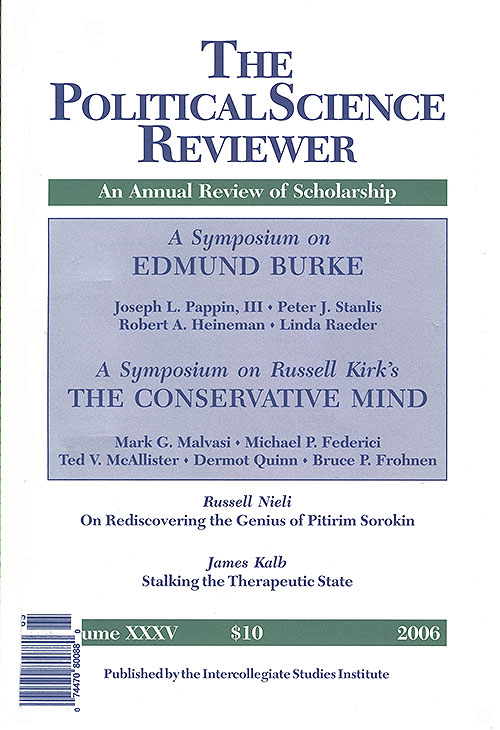Keywords
How to Cite
Abstract
Edmund Burke is recognized by most modern conservatives asthe founding father of conservative political philosophy. Infact, it is practically inescapable for those who claim to beconservatives that they recognize Burke as the fountainhead ofconservatism. For the most part the Reflections on the Revolutionin France is cited as the seminal text, with its emphasis uponorder, custom, just prejudice, historical precedent, and prescriptiverights in the face of radical Jacobinism. Burke's rage againstthe French philosophes such as Rousseau, Voltaire, and Diderotwas in large part due to their rejection of religion, property, andconstitutional monarchy and their embrace of fanatical atheism,as he regarded their ultimate foundation. Burke's stance, based onsolid principles of justice and tradition, and also reflecting naturalsentiments of respect for the manners and habits of an orderedsociety, seems to have a transparency that is clear to all.
Similar Articles
- Linda C Raeder, Edmund Burke , The Political Science Reviewer: Vol. 35 (2006): Symposia on Edmund Burke and on Russell Kirk’s <em>The Conservative Mind</em>
- Burke A. Hendrix, Edmund Burke, Native Americans, and the Burkean Imagination , The Political Science Reviewer: Vol. 42 No. 1 (2018): Symposium: Philosophy in Weimar Germany
- Ross Carroll, Edmund Burke, Imperialist Ideologue? , The Political Science Reviewer: Vol. 42 No. 1 (2018): Symposium: Philosophy in Weimar Germany
- Lida Maxwell, Burke, Cultural Difference, and the Problem of Imperial Critique , The Political Science Reviewer: Vol. 42 No. 1 (2018): Symposium: Philosophy in Weimar Germany
- Ted V McAllister, What Does Burke Have to Do With America? , The Political Science Reviewer: Vol. 40 (2016): A Symposium on Paul Gottfried’s Conservatism in America
- Brandon Turner, O’Neill on Burke’s Not-Particularly- Conservative Logic of Empire , The Political Science Reviewer: Vol. 42 No. 1 (2018): Symposium: Philosophy in Weimar Germany
- Onur Ulas Ince, Political Economy and Edmund Burke’s (Il)Liberal Logic of Empire , The Political Science Reviewer: Vol. 42 No. 1 (2018): Symposium: Philosophy in Weimar Germany
- Robert A Heineman, Edmund Burke and the American Nation , The Political Science Reviewer: Vol. 35 (2006): Symposia on Edmund Burke and on Russell Kirk’s <em>The Conservative Mind</em>
- William F Byrne, Edmund Burke and the Politics of Empire , The Political Science Reviewer: Vol. 37 (2008): Symposium: The Life and Work of Michael Polanyi
- Onur Ulas Ince, Burke A. Hendrix, Lida Maxwell, Ross Carroll, Brandon Turner, Daniel I. O’Neill, Author Meets Critics , The Political Science Reviewer: Vol. 42 No. 1 (2018): Symposium: Philosophy in Weimar Germany
You may also start an advanced similarity search for this article.
Most read articles by the same author(s)
- Kenneth L Deutsch, Interwar German-Speaking Emigrés and American Political Thought , The Political Science Reviewer: Vol. 29 (2000): A Symposium on Herbert J Storing
- Quentin P Taylor, Publius and Persuasion , The Political Science Reviewer: Vol. 31 (2002): A Symposium on Gerhart Niemeyer
- Victor Bruno, Philosophy, Mysticism, and World Empires , The Political Science Reviewer: Vol. 43 No. 1 (2019): Essays
- Paul Peterson, The Rhetorical Design and Theoretical Teaching of Federalist No. 10 , The Political Science Reviewer: Vol. 17 (1987): Symposium: The Constitutional Convention of 1787
- Richard Avramenko, The Gnostic and the Spoudaios , The Political Science Reviewer: Vol. 41 No. 1 (2017): Symposium: Eric Voegelin and the Ancients
- Nathan Pinkoski, Why Alasdair MacIntyre is not a Conservative Post-Liberal , The Political Science Reviewer: Vol. 43 No. 2 (2019): Symposium: The Missouri Compromise at 200
- Matthew Van Hook, Myth, Moderate, or Machiavellian? , The Political Science Reviewer: Vol. 44 No. 2 (2020): Symposium: Leadership and the History of Political Thought
- George Thomas, Liberal Tolerance and Mere Civility , The Political Science Reviewer: Vol. 42 No. 2 (2018): Symposium: The Political Thought of Robert Nisbet
- Eduardo Schmidt Passos, Carl Schmitt’s Political Theory during the Third Reich , The Political Science Reviewer: Vol. 42 No. 1 (2018): Symposium: Philosophy in Weimar Germany
- Grant Havers, Leo Strauss on Nazism , The Political Science Reviewer: Vol. 42 No. 1 (2018): Symposium: Philosophy in Weimar Germany
